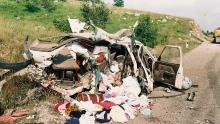Ante Gotovina
Refugee Bombing Case Highlights Serbia and Croatia’s Enduring Antagonism
The man identified in court in The Hague as Witness 56 was a Serb policeman in the Croatian town of Knin between May 1994 and August 5, 1995. That was the date when he left the country, along with around 200,000 other Serbs, as the Croatian Army crushed Serb rebel forces during Operation Storm.
Tudjman’s ‘Freedom Train’: Celebrating Croats’ Victory and Serbs’ Exodus
"Gentlemen, I want to talk a little bit more about [our] promotional focus, given the advantages gained from Storm," Tudjman said as he opened the session.
Croatian Serbs Commemorate Victims of 1995 Operation Storm
Croatian Serb advocacy orgnisations and other human rights organisations on Wednesday started a six-day campaign to commemorate the Serbian civilian victims of the Croatian army's 1995 Operation "Oluja" ("Storm").
The operation terminated an ethnic Serb rebellion but also resulted in some 200,000 Serbs being expelled or fleeing the Knin region in southwest Croatia.
"Some say that the Hague judges took a lot of money for that. This is revenge on us"
"We can always determine who is responsible during the wars, but this is neither the time nor the place. I think it is extremely important to point out to the citizens of Serbia that the rules and court practice in the Markac and Gotovina cases have changed," Serbian President said.
Croatian TV Series Ridiculed for ‘Caricaturing’ Wartime General
"Goodbye, #GeneralHRT. Monday will never be the same again," one Twitter user wrote on Monday evening after the last episode of the TV series 'The General' was aired on Croatian public television station HRT.
Croatia’s State-Funded Gotovina Movie Reinforces War Myths
Gotovina became a national icon when he was indicted in July 2001 by the International Criminal Tribunal for the Former Yugoslavia, ICTY for large-scale crimes against Serb civilians during and after Operation Storm. A broad section of the Croatian public supported his cause, seeing him as a victim of unfair treatment of the young Croatian state by the international community.
Croatian Generals’ ‘Secret’ Defence Contract Queried at European Court
A Croatian NGO asked the European Court of Human Rights to examine the Zagreb government's refusal to release information about a contract for legal representation for generals Mladen Markac and Ante Gotovina at their Hague Tribunal appeal.
Zagreb Cuts Bosnian Croat War Criminal’s Sentence
A Zagreb court reduced former Croatian Defence Council officer Marko Radic’s sentence for crimes against humanity because the Croatian legal system does not recognise the concept of a ‘joint criminal enterprise’.
- Read more about Zagreb Cuts Bosnian Croat War Criminal’s Sentence
- Log in to post comments
Charges brought in "Petrovacke ceste" war crime case
The case involves Croatian military planes bombing Serbian refugees on August 9, 1995 near Banacki Petrovac in Bosnia and Herzegovina, when nine people - four children and six adults - were killed and 50 were injured or badly wounded.
Croatian president blasted for "uttering bunch of nonsense"
This is according to President of the Alliance of Serbs from the Region Miodrag Linta, who commented on Grabar-Kitarovic saying that although the Hague found the country's 1990s-era state leaders to have been members of a joint criminal enterprise, it was Serbia, rather than Croatia, who was "the aggressor."









